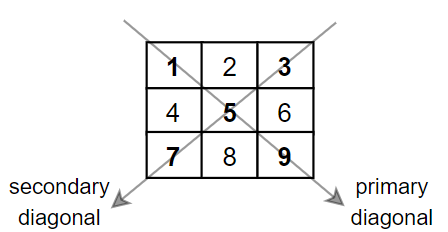Tag: Depth-First Search Breadth-First Search Matrix
Given a square matrix mat, return the sum of the matrix diagonals.
Only include the sum of all the elements on the primary diagonal and all the elements on the secondary diagonal that are not part of the primary diagonal.
Example 1:
Input: mat = [[1,2,3],
[4,5,6],
[7,8,9]]
Output: 25
Explanation: Diagonals sum: 1 + 5 + 9 + 3 + 7 = 25
Notice that element mat[1][1] = 5 is counted only once.
Example 2:
Input: mat = [[1,1,1,1],
[1,1,1,1],
[1,1,1,1],
[1,1,1,1]]
Output: 8
Example 3:
Input: mat = [[5]]
Output: 5
Constraints:
n == mat.length == mat[i].length1 <= n <= 1001 <= mat[i][j] <= 100
class Solution:
def diagonalSum(self, mat: List[List[int]]) -> int:
ROWS, COLS = len(mat), len(mat[0])
visited = set()
ans = 0
def dfs(row, col, is_right):
nonlocal ans
# Base cases
if not (0 <= row < ROWS and 0 <= col < COLS):
return
if (row, col) in visited:
ans -= mat[row][col]
ans += mat[row][col]
visited.add((row, col))
if is_right:
dfs(row + 1, col + 1, is_right)
else:
dfs(row + 1, col - 1, is_right)
return ans
dfs(0, 0, True)
dfs(0, COLS - 1, False)
return ansclass Solution:
def diagonalSum(self, mat: List[List[int]]) -> int:
ROWS, COLS = len(mat), len(mat[0])
rightward, leftward = [(1, 1)], [(1, -1)]
visited = set()
ans = 0
def dfs(row, col, is_right):
nonlocal ans
# Base cases
if not (0 <= row < ROWS and 0 <= col < COLS):
return 0
if (row, col) in visited:
ans -= mat[row][col]
ans += mat[row][col]
visited.add((row, col))
if is_right:
direction = rightward
else:
direction = leftward
[dfs(row + dx, col + dy, is_right) for dx, dy in direction]
return ans
dfs(0, 0, True)
dfs(0, COLS - 1, False)
return ansclass Solution:
def diagonalSum(self, mat: List[List[int]]) -> int:
ROWS, COLS = len(mat), len(mat[0])
rightward, leftward = [(1, 1)], [(1, -1)]
visited = set()
ans = 0
queue = collections.deque([(0, 0, True), (0, COLS - 1, False)])
while queue:
row, col, is_right = queue.popleft()
if not (0 <= row < ROWS and 0 <= col < COLS):
continue
if (row, col) in visited:
ans -= mat[row][col]
ans += mat[row][col]
visited.add((row, col))
if is_right:
direction = rightward
else:
direction = leftward
for next_row, next_col in [(row + dx, col + dy) for dx, dy in direction]:
queue.append((next_row, next_col, is_right))
return ansclass Solution:
def diagonalSum(self, mat: List[List[int]]) -> int:
n = len(mat)
ans = 0
for i in range(n):
ans += mat[i][i]
ans += mat[n - 1 - i][i]
if n % 2 != 0:
ans -= mat[n // 2][n // 2]
return ansclass Solution:
def diagonalSum(self, mat: List[List[int]]) -> int:
n = len(mat)
ans = 0
for i in range(n):
ans += mat[i][i]
if i == n - 1 - i:
continue
ans += mat[n - 1 - i][i]
return ansclass Solution:
def diagonalSum(self, mat: List[List[int]]) -> int:
return sum(mat[i][i] + (mat[i][len(mat) - i - 1] if i != len(mat) - i - 1 else 0) for i in range(len(mat)))class Solution:
def diagonalSum(self, mat: List[List[int]]) -> int:
return sum(row[i] + row[len(mat) - i - 1] for i, row in enumerate(mat)) - mat[len(mat) // 2][len(mat) // 2] * (len(mat) % 2)
